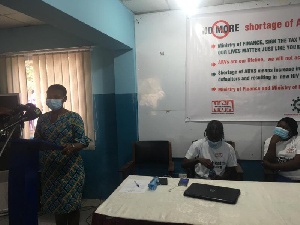 Mrs Elsie Ayeh, National President for the Ghana Network of Persons Living with HIV
Mrs Elsie Ayeh, National President for the Ghana Network of Persons Living with HIV
The Non-State Actors for Health and Development Ghana (NSA-Ghana), on Wednesday called on the Ministry of Health to immediately re-stock the country’s regional medical stores and health facilities with Anti-Retroviral (ARV) drugs, which has currently run out.
They further urged the Ministry of Finance to urgently release clearance for Anti-Retroviral (ARV) drugs that had been stocked at Ghana’s port for almost six months now.
According to the Actors, the country was currently facing stock-out of ARVs across various regions, especially in Ashanti and Eastern, creating serious situations where clients, involving Persons Living with HIV (PLHIV), had been turned away by health facilities due to the shortages and non-availability of these medications.
Mrs Elsie Ayeh, the National President for the Ghana Network of Persons Living with HIV (NAP+ Ghana), at a press conference in Accra, blamed the requisite authorities, particularly the Ministry of Finance, for failing to issue the needed Tax Waivers to clear the drugs from the port since July 2020.
She said ARVs had been a major life-saver for PLHIV, and their shortage could lead to lapses in the treatment regime, leading to drug resistance and other severe complications that could adversely erode all the gains made towards achieving the 90-90-90 target.
Mrs Ayeh claimed that although being a lower-middle-income country, Ghana enjoyed financial support from the Global Fund to fight AIDS, Tuberculosis, Malaria (GF-ATM), and the President’s Emergency Plan for AIDS Relief (PEPFAR), to the tune of $933 million in grants to save lives.
She said, the government, being a co-financier, had over the period failed to honour its part of the obligation in a timely manner.
“In addition, the Government has failed to provide the needed tax exemption on commodities, including ARVs procured with donor funds in a timely manner,” she said.
She said ARVs were not only life-saving medicines for PLHIV but were equally important in halting the spread of HIV when used as both Post Exposure Prophylaxis (PEP) and Pre-Exposure Prophylaxis (PrEP).
“They are also very important in halting the spread of Mother to Child Transmission of HIV to ensure every child in Ghana is born free of HIV, can shine and eventually become strong leaders of the country”.
Mrs Ayeh insisted that a timely, adequate, and sustainable supply of these commodities could, therefore, under no circumstances, be compromised.
She said controlling the epidemic in Ghana was a shared responsibility, saying, ending HIV and AIDS could be elusive by 2030 if plans were not put in place to mobilize domestic resources to run effective programmes.
Ms Juliana Narh, the Eastern Regional Correspondent for NAP+, said a follow-up to some regional health facilities including the St. Joseph Catholic; Atua Government; Nkawkaw, St. Martin; Nsawam Government; and New Abrem hospitals respectively confirmed situations of total stock-outs.
She said other places reported of limited supplies where a bottle of ARV was shared among three clients, and others were given two weeks or ten days to return for further medications.
She said a follow-up to the Eastern regional central medical stores as at the morning of December 16, 2020, again confirmed a total stock-out of ARVs.
Ms Narh argued that the scary gap could create lack of trust in the health system, leading PLHIV no option than to resort to herbal or spiritual support from prayer camps.
She also drew the attention of the MOH and Ghana Health Service to the urgent need for a replacement of the machine for viral load count in the Eastern region which was currently obsolete, leading to delays in releasing results.
Ms Priscilla Addo, the representative of the YHAG, said the issue shortages if not resolved could spell doom for the over 21,000 young people living with HIV, and deflate the population of active youth who were working towards the country’s development.